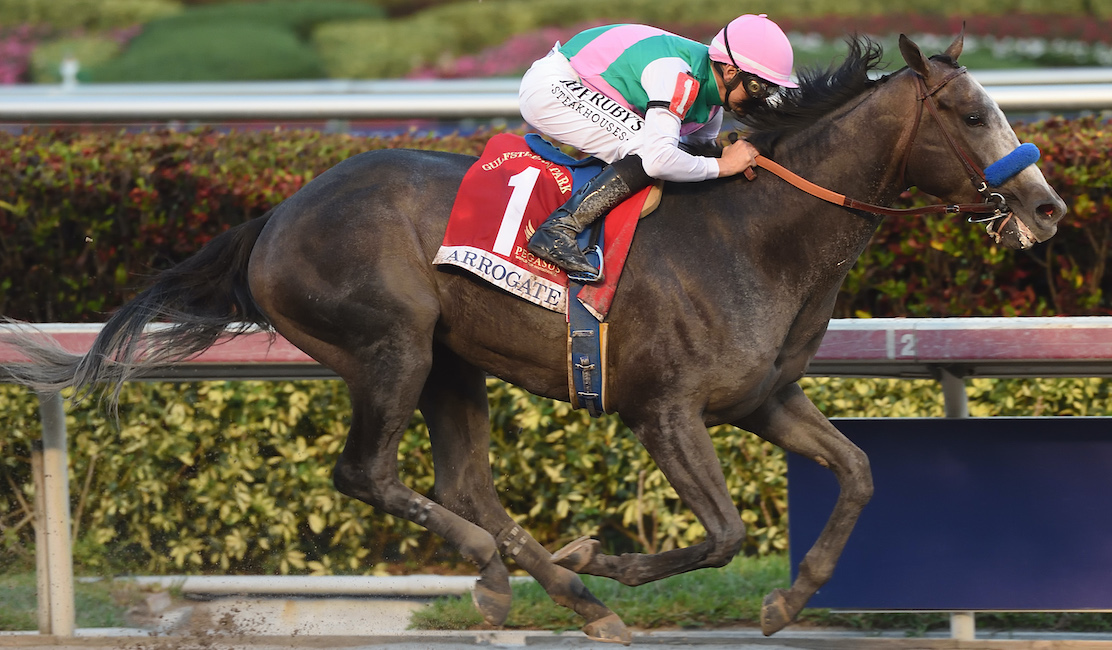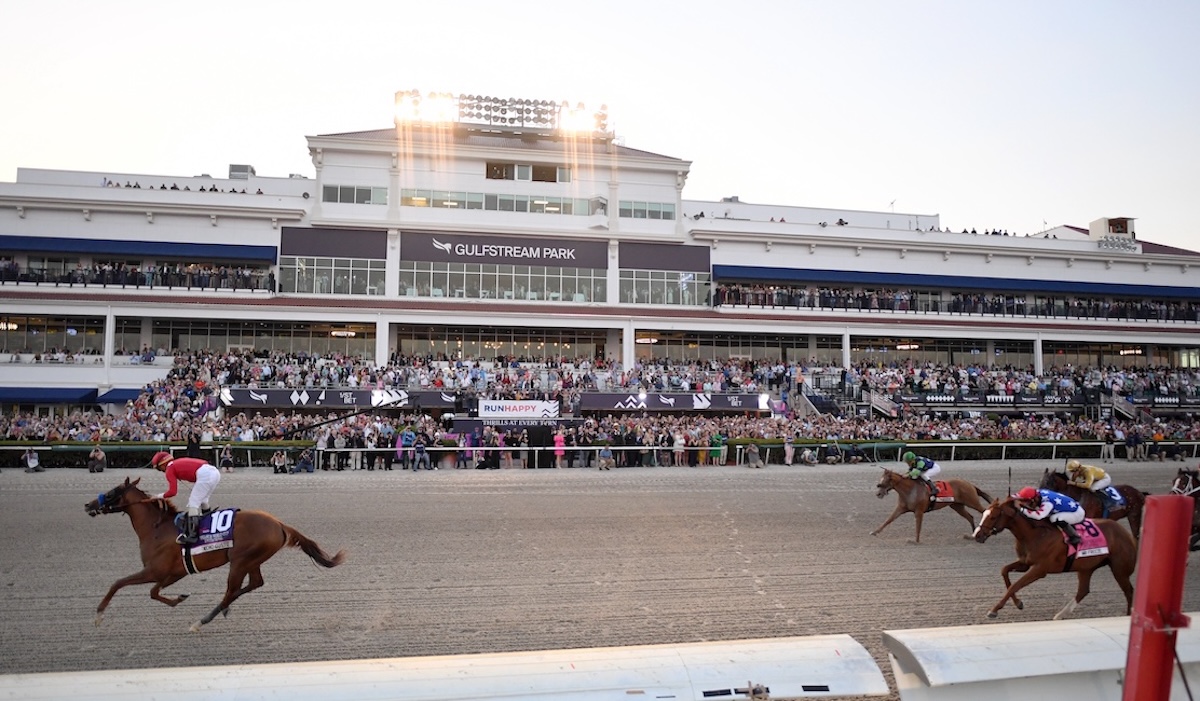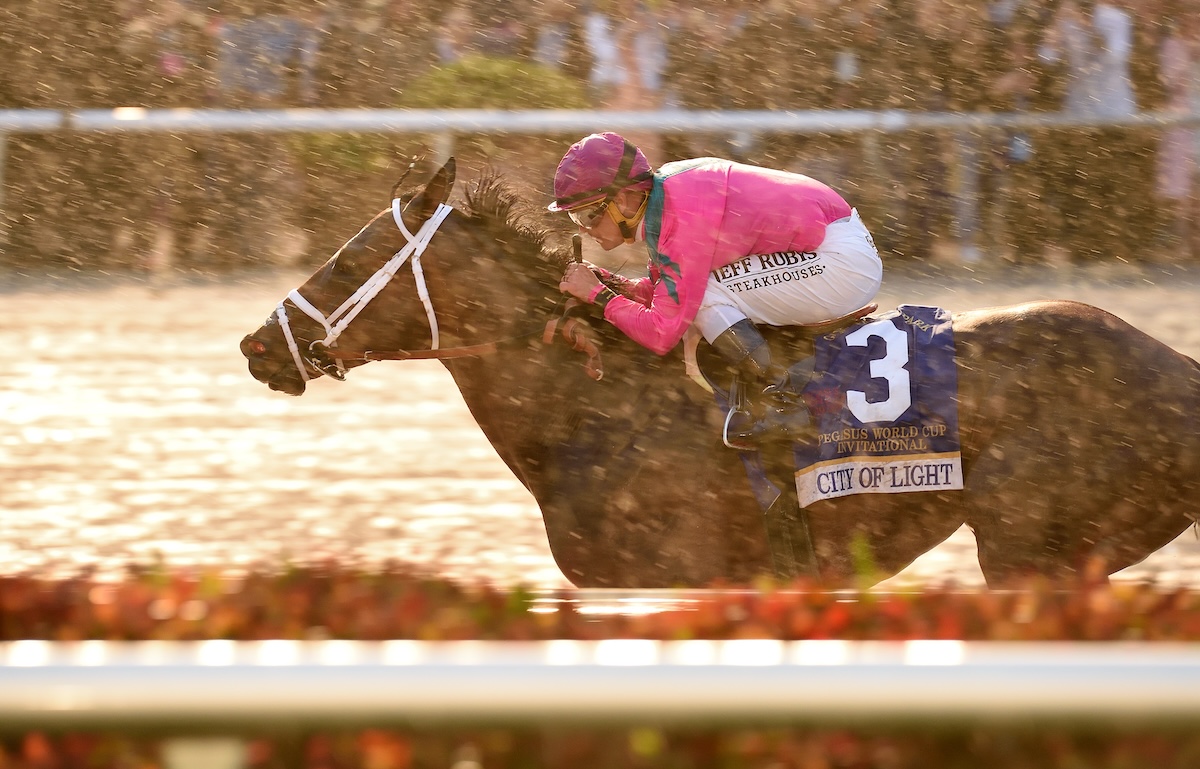
As it enters its ninth edition, the Gulfstream Park showpiece remains an intriguing race – but it is no longer a game-changer. Steve Dennis relives eight years of what began life as the world’s richest race
Eight years ago, the Pegasus World Cup smashed into the racing landscape like a gold-plated comet with a tail formed of dollar bills, a colossal disruptor of a race with a hubristically alluring name designed to make an impact that would leave a permanent impression on the sport.
 It certainly started that way, with its $12 million hook making it the richest race on the planet and one underwritten by a novel ‘stake-holder’ entry system.
It certainly started that way, with its $12 million hook making it the richest race on the planet and one underwritten by a novel ‘stake-holder’ entry system.
In the years since its inception, however, the Gulfstream Park showpiece has shed most of its initial lustre and three-quarters of its prize fund. It is now simply a very valuable race jostled among a growing number of other very valuable races, still an intriguing element of the racing game but not a game-changer.
The concept came from Frank Stronach, founder and president of the Stronach Group that owned – among other tracks – Gulfstream Park. The money would come from big-scale owners paying $1m apiece for a place in the gate, the right to nominate one of their horses to the 12-runner, nine-furlong contest that replaced the venerable Donn Handicap in the calendar and assumed its G1 status.
That $1m ‘stake’ could be shared with or traded between interested parties, and the race’s late-January date neatly bisected the Breeders’ Cup and the Dubai World Cup (which it usurped as the world’s most valuable horse race), creating a natural paved-with-gold pathway for the best horses in the world. The winner’s purse was $7m and even the last horse to cross the line would bank $250,000.
“I think it’s good for racing, and it’s not a conflict. We want to make sure it doesn’t hurt the Breeders’ Cup, or Dubai World Cup, or the Japan Cup,” said Stronach.
Stronach’s baby has certainly enhanced the relatively fallow midwinter stretch of the international racing schedules, hasn’t hurt the three races cited, and has been won by one or two of the biggest names in the sport – all the winners have been US-based, though, with the race’s ‘World Cup’ tag (like the World Series, perhaps) never a factor at any stage.
 In 2018 the prize fund was increased to $16m, with the Stronach Group contributing $4m to the coffers, but the expansion of the occasion the following year to include the Pegasus World Cup Turf led to a reduction in purse to a ‘mere’ $9m – robbing the race of its position as the world’s richest.
In 2018 the prize fund was increased to $16m, with the Stronach Group contributing $4m to the coffers, but the expansion of the occasion the following year to include the Pegasus World Cup Turf led to a reduction in purse to a ‘mere’ $9m – robbing the race of its position as the world’s richest.
The following year the entry-fee system was scrapped and the race’s value was cut to $3m, the level at which it has remained, big but no longer breathtaking, alluring but no longer awe-inspiring, dwarfed by the upstart $20m Saudi Cup and by all the races Stronach was keen to avoid hurting.
The 2025 renewal is headed by last year’s Kentucky Derby winner Mystik Dan, 2023 Breeders’ Cup Classic winner White Abarrio and dual G1 winner Locked. It promises to be a good race, as ever, but the Pegasus no longer flies at the level Stronach had envisaged in his daydreams of world domination.
2017 Arrogate (trainer Bob Baffert/jockey Mike Smith)
For all its glamour and greenbacks, the new race needed a bona fide champion to endow it with some instant prestige and along came Arrogate to play that role to perfection.
The inaugural Pegasus World Cup was billed as another mouthwatering showdown between US racing’s two starriest names after Arrogate and California Chrome had run one-two in the Breeders’ Cup Classic, and it was 16-1 bar the pair.
Unfortunately the charismatic fan-favourite California Chrome was never at the races, trailing in ninth as Arrogate produced an exhilarating, dominant performance to beat Shaman Ghost – owned by Stronach himself – by 4¾ lengths.
“The concept is good,” said victorious trainer Bob Baffert. “It’s good for racing in general. I never thought I’d be here in a $12m race.
“What else would we be doing right now? Getting ready for the Super Bowl? C’mon. This is our Super Bowl.”
2018 Gun Runner (Steve Asmussen/Florent Geroux)
Another year, another reunion for the first three in the Breeders’ Cup Classic, and another champion dominant in the richest race ever run on American soil (well, dirt). Even last-placed Toast Of New York, a Brit who remains the only European runner in Pegasus history, collected $650,000 for being beaten 50 lengths.
The tote board indicated 11-10 chalk Gun Runner would pull off the double, mirroring Arrogate’s achievement, and the outcome was never in doubt after he had cruised into the lead with three furlongs to run.
He kept the pedal down to see off Classic third West Coast by 2½ lengths, with Classic runner-up Collected only seventh after setting the early fractions. The $7m winner’s purse made Gun Runner the second-biggest earner in US history – behind Arrogate.
“I don’t know if I’ve ever wanted anything in a horse race more than I wanted this,” said trainer Steve Asmussen. “So proud, so proud.”
2019 City Of Light (Michael McCarthy/Javier Castellano)
Once again the Breeders’ Cup Classic winner – Accelerate – was favourite to add the Pegasus to his laurels, but this time it was another BC winner, the Dirt Mile hero City Of Light, who led the way by a clear-cut margin.
On a filthy day in Florida, under rain clouds over a sloppy track, City Of Light was second-choice at 9-5 and looked a lock from the moment he took up the running on the far turn. Accelerate tried to match strides but was swiftly put away and City Of Light drew off to win by 5¾ lengths from longshot Dirt Mile runner-up Seeking The Soul. The Mexican Triple Crown winner Kukulkan added a dash of exoticism but finished second-last.
“He’s the horse of a lifetime,” said trainer Michael McCarthy. “I am not sure where I would be without him. I thought the Breeders’ Cup was almost like an out-of-body experience. Today was, I don’t know …”
2020 Mucho Gusto (Bob Baffert/Irad Ortiz)
Money can’t buy you love, but it can certainly buy a top-class field of racehorses. So it was no surprise when the drastic reduction in purse for the 2020 edition – $9m to $3m – attracted the least distinguished bunch yet, with no Breeders’ Cup winners and favourite Omaha Beach scratched two days before the race.
The favoured Higher Power, coming off the show spot in the BC Classic, ran the worst race of his life when trailing in last of ten, leaving the way open for second-choice Mucho Gusto – who had never won a G1 – to provide Bob Baffert with a second victory in the Pegasus. The 3-1 chance was another wide-margin winner, pulling away through the stretch to hose his rivals – headed by Mr Freeze – by 4½ lengths.
“When he tilted out at the quarter-pole all I could say was ‘Damn, I wish I would have flown down there!’,” said Baffert, watching from home at Santa Anita.
2021 Knicks Go (Brad Cox/Joel Rosario)
Normal ‘Pegasus’ service was resumed despite the purse remaining at $3m, with the dozen runners headed by Breeders’ Cup Dirt Mile winner Knicks Go, a 6-5 shot with only two rivals trading at single-figure odds.
The race seemed his to lose on paper and that wasn’t going to happen on dirt when the gray made his habitual fast start, taking command in the first few strides and never relinquishing the lead thereafter, coasting home dialled down by 2¾ lengths from Jesus’ Team.
A G1 winner at two, a zero-for-eight flop at three, Knicks Go joined trainer Brad Cox for his four-year-old campaign and won two allowances before returning to the top level in dramatic fashion for the Dirt Mile and the Pegasus. At the other end of the year, he would add the BC Classic to his haul.
“Great horses do great things, and he did something great today,” said Cox. “I’m very proud of him.”
2022 Life Is Good (Todd Pletcher/Irad Ortiz)
Knicks Go might have done another great thing in 2022, coming off a Breeders’ Cup Classic romp to bid for back-to-back Pegasuses, with only one valid rival in a weak, shortish field of nine.
However, that challenger was the explosive Life Is Good, who had blown away the opposition in the BC Dirt Mile, and the pair were both odds-on – Life Is Good a slight 4-5 favourite – with the rest 19-1 and upwards. This was a duel; who would outdraw the other?
Life Is Good was quickest on the trigger, surging to the lead before the first turn and putting Knicks Go on the back foot, and he simply rolled gate-to-wire in awesome style, putting away his big rival by 3¼ lengths.
“I can’t think of a horse I trained that’s better than him,” said Todd Pletcher. “He’s extra-special. He has that ability to go fast and keep going. It’s fun to watch.”
2023 Art Collector (Bill Mott/Junior Alvarado)
The outlier of the Pegasus World Cup roll of honour in that the winner Art Collector is the only longshot to be successful, with all the other editions going to the chalk or the second-favourite.
Art Collector hadn’t been anywhere near the Breeders’ Cup and was a 15-1 poke as sixth-choice, with BC Dirt Mile runner-up Cyberknife an uneasy market leader in a race that lacked a stand-out star.
However, for once Art Collector was blessed with temporary superstar quality, taking the race by the scruff of the neck at the top of the lane and careering away to score by 4½ lengths from Defunded, with Cyberknife a no-show sixth.
“I don’t have the words to put it together,” said jockey Junior Alvarado, riding the six-year-old for the first time. “It’s unbelievable. He’s a very good horse who I’ve been following for a while and I’m so glad I got a chance to ride him.”
2024 National Treasure (Bob Baffert/Flavien Prat)
It took eight years for the Pegasus to be decided in close quarters, the photo-finish camera a redundant piece of kit time after time as each winner came away for an easy victory.
Again there was no true A-lister among the dozen runners, with Preakness winner and Breeders’ Cup Dirt Mile runner-up National Treasure a narrow 5-2 favourite over wiseguy contender First Mission – for whom this was a first crack at G1 level and a step for which he was not remotely equipped – eventually finishing a flat ninth.
National Treasure was a very different proposition, sitting behind the fast fractions of Hoist The Gold before asserting in early stretch and having just enough gas in the tank to turn back the hard-charging Senor Buscador by a neck.
“I’ve always thought he was that good,” said trainer Bob Baffert, signing for his third Pegasus World Cup from just six starters. “But you still need a lot of luck.”
• Visit the Pegasus World Cup website and the Gulfstream Park website
Shooting star with a personal impact: ‘You never forget a horse like Candy Ride’ – Julie Krone
View the latest TRC Global Rankings for horses / jockeys / trainers / sires



